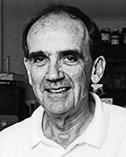
Richard V. Wolfenden
The University of North Carolina at Chapel Hill
|
Primary Section: 21, Biochemistry Secondary Section: 29, Biophysics and Computational Biology Membership Type:
Member
(elected 2002)
|
Research Interests
Much of my work is based on M. Polanyi's thermodynamic demonstration that the action of any catalyst depends on its ability to bind the altered substrate in the transition state more tightly than in the ground state, relaxing again to release the product. That momentary jump matches or exceeds the rate acceleration that an enzyme produces. Whereas enzyme reactions transpire in milliseconds, we have shown that some biological reactions require millions of years in the absence of a catalyst. Accordingly, stable analogues of the altered substrate in the transition state should be powerful inhibitors. Since our first successful test of that principle, in 1969, we and others have shown that transition state and multisubstrate analogues act as strong inhibitors of enzymes of every class, furnishing a practical basis for drug design. We use mutations of enzymes and inhibitors, along with structural information obtained by UV, X-ray, NMR, and mass spectrometry, to characterize the attractive forces responsible for transition state affinity and thus for catalysis itself. We have found that these forces exhibit high levels of synergism, associated with a tendency of enzyme active sites to surround the substrate so that their solid angle of contact is maximized.

